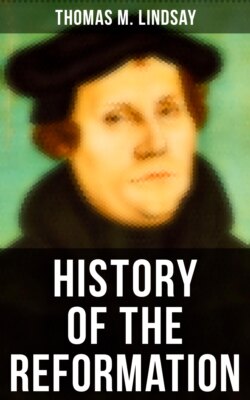Читать книгу History of the Reformation - Thomas M. Lindsay - Страница 68
На сайте Литреса книга снята с продажи.
§ 1. The Roman Nuncio Aleander.
ОглавлениеTable of Contents
Rome had done its utmost to get rid of Luther by ecclesiastical measures, and had failed. If he was to be overthrown, if the new religious movement and the national uprising which enclosed it were to be stifled, this could only be done by the aid of the supreme secular authority. The Curia turned to the Emperor.
Maximilian had died suddenly on the 12th of January 1519. After some mouths of intriguing, the papal diplomacy being very tortuous, his grandson Charles, the young King of Spain, was unanimously chosen to be his successor (June 28th, 1519). Troubles in Spain prevented him leaving that country at once to take possession of his new dignities. He was crowned at Aachen on the 23rd of October 1520, and opened his first German Diet on January 22nd, 1521, at Worms.
The Pope had selected two envoys to wait on the young Emperor, the Protonotary Marino Caraccioli (1469–1530), who was charged with the ordinary diplomatic business, and Jerome Aleander, the Director of the Vatican Library, who was appointed to secure the outlawry of Luther.
The Roman Curia had in Aleander one of the most clear-sighted, courageous, and indefatigable of diplomatists. He was an Italian, born of a burgher family in the little Venetian town of Motta (1480–1542), educated at Padua and Venice; he had begun life as a Humanist, had lectured on Greek with distinction in Paris, and had been personally acquainted with many of the German Humanists, who could not forgive the “traitor” who had deserted their ranks to serve an obscurantist party. His graphic letters, full of minute details, throb with the hopes and fears of the papal diplomacy. The reader has his fingers on the pulse of those momentous mouths. The Legate was in a land where “every stone and every tree cried out, ‘Luther.’ ” Landlords refused him lodging. He had to shiver during these winter months in an attic without a stove. The stench and dirt of the house were worse than the cold. When he appeared on the streets he saw scowling faces, hands suddenly carried to the hilts of swords, heard curses shrieked after him. He was struck on the breast by a Lutheran doorkeeper when he tried to get audience of the Elector of Saxony, and no one in the crowd interfered to protect him. He saw caricatures of himself hanging head downwards from a gibbet. He received the old deadly German feud-letters from Ulrich von Hutten, safe in the neighbouring castle of Ebernberg, about a day's ride distant.177 The imperial Councillors to whom he complained had neither the men nor the means to protect him. When he tried to publish answers to the attacks on the Papacy which the Lutheran presses poured forth, he could scarcely find a printer; and when he did, syndicates bought up his pamphlets and destroyed them. As the weeks passed he came to understand that there was only one man on whom he could rely—the young Emperor, believed by all but himself to be a puppet in the hands of his Councillors, whom Pope Leo had called a “good child,” but whom Aleander from his first interview at Antwerp had felt to be endowed with “a prudence far beyond his years,” and to “have much more at the back of his head than he carried on his face.” He also came to believe that the one man to be feared was the old Elector of Saxony, “that basilisk,” that “German fox,” that “marmot with the eyes of a dog, who glanced obliquely at his questioners.”
Aleander was a pure worldling, a man of indifferent morals, showing traces of cold-blooded cruelty (as when he slew five peasants for the loss of one of his dogs, or tried to get Erasmus poisoned). He believed that every man had his price, and that low and selfish motives were alone to be reckoned with. But he did the work of the Curia at Worms with a thoroughness which merited the rewards he obtained afterwards.178 He had spies everywhere—in the households of the Emperor and of the leading princes, and among the population of Worms. He had no hesitation in lying when he thought it useful for the “faith,” as he frankly relates.179 The Curia had laid a difficult task upon him. He was to see that Luther was put under the ban of the Empire at once and unheard. The Bull had condemned him: the secular power had nothing to do but execute the sentence. Aleander had little difficulty in persuading the Emperor to this course within his hereditary dominions. An edict was issued ordering Luther's books to be burnt, and the Legate had the satisfaction of presiding at several literary auto-da-fés in Antwerp and elsewhere. He was also successful with some of the ecclesiastical princes of Germany.180 But it was impossible to get this done at Worms. Failing this, it was Aleander's business to see that Luther's case was kept separate from the question of German national grievances against the Papacy, and that, if it proved to be impossible to prevent Luther appearing before the Diet, he was to be summoned there simply for the purpose of making public recantation. With the assistance of the Emperor he was largely successful.181
